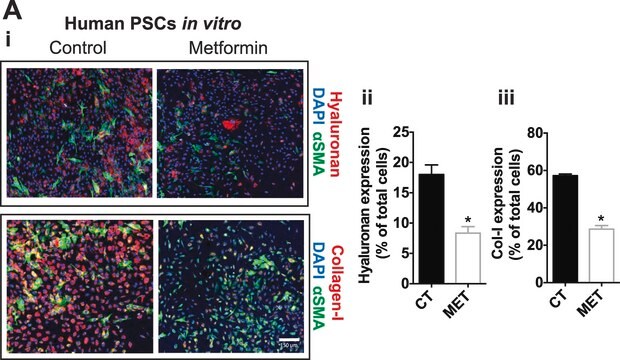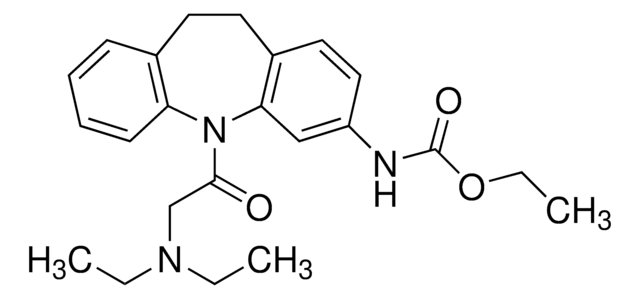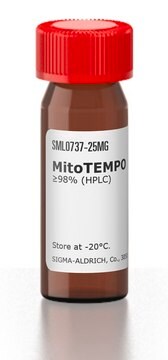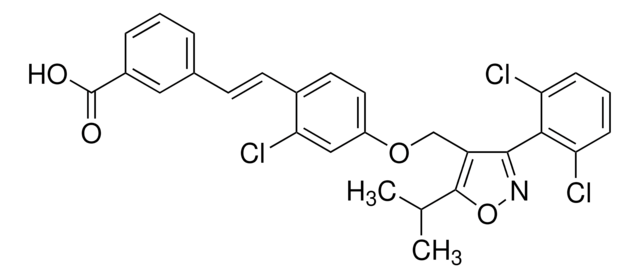おすすめの製品
品質水準
アッセイ
≥98% (HPLC)
フォーム
solid
色
white
溶解性
DMSO: >10 mg/mL
H2O: insoluble
保管温度
2-8°C
SMILES記法
Clc1cnc(Oc2ccc(Oc3ncc(Cl)cc3Cl)cc2)c(Cl)c1
InChI
1S/C16H8Cl4N2O2/c17-9-5-13(19)15(21-7-9)23-11-1-2-12(4-3-11)24-16-14(20)6-10(18)8-22-16/h1-8H
InChI Key
BAFKRPOFIYPKBQ-UHFFFAOYSA-N
遺伝子情報
human ... NR1I3(9970)
アプリケーション
TCPOBOPは、マウス肝細胞癌細胞のMcl-1-Italics増進機能を強化する目的に使用されています。TCPOBOPは、マウス肝細胞において構成的アンドロスタン受容体(CAR)が誘起する遺伝子発現の研究にも使用されています。
生物化学的/生理学的作用
TCPOBOPは核内レセプタ-CARの用量依存的な直接アゴニストとして、シトクロムP450(CYP)のCARトランス活性化を促進します。CYPを誘導する既知のフェノバルビタ-ル様物質のうち最も強力な分子です。
特徴および利点
本製品は、アポトーシス研究のページに記載されています。アポトーシ関連製品について、さらにご覧になるにはClick hereをクリックしてください。その他の研究領域用の生物活性低分子に関する詳細については、sigma.com/discover-bsmをご参照ください。
調製ノート
TCPOBOPは10 mg/ml以上の濃度までDMSOに溶解します。水には不溶です。
保管分類コード
11 - Combustible Solids
WGK
WGK 3
引火点(°F)
Not applicable
引火点(℃)
Not applicable
個人用保護具 (PPE)
Eyeshields, Gloves, type N95 (US)
適用法令
試験研究用途を考慮した関連法令を主に挙げております。化学物質以外については、一部の情報のみ提供しています。 製品を安全かつ合法的に使用することは、使用者の義務です。最新情報により修正される場合があります。WEBの反映には時間を要することがあるため、適宜SDSをご参照ください。
Jan Code
T1443-VAR:
T1443-5MG:
T1443-BULK:
T1443-IP:
T1443-BULK-CR:
Albert Braeuning et al.
Drug metabolism and disposition: the biological fate of chemicals, 37(5), 1138-1145 (2009-02-25)
Basal as well as xenobiotic-induced expression of the main enzymes from phase I and phase II of drug metabolism is confined to the perivenous areas of the mammalian liver lobule. Whereas signal transduction pathways that govern xenobiotic-induced expression of these
Christopher Reed et al.
The American journal of pathology, 184(6), 1853-1859 (2014-04-15)
Diverse etiologic events are associated with the development of hepatocellular carcinoma. During hepatocarcinogenesis, genetic events likely occur that subsequently cooperate with long-term exposures to further drive the progression of hepatocellular carcinoma. In this study, the frequent loss of the retinoblastoma
Nicholas J Lodato et al.
Toxicological sciences : an official journal of the Society of Toxicology, 164(1), 115-128 (2018-04-05)
Activation of the nuclear receptor and transcription factor CAR (Nr1i3) by its specific agonist ligand TCPOBOP (1, 4-bis[2-(3, 5-dichloropyridyloxy)]benzene) dysregulates hundreds of genes in mouse liver and is linked to male-biased hepatocarcinogenesis. To elucidate the genomic organization of CAR-induced gene
Josiah E Hardesty et al.
Xenobiotica; the fate of foreign compounds in biological systems, 47(9), 807-820 (2016-07-28)
1. Polychlorinated biphenyls (PCBs) are persistent environmental pollutants that disrupt hepatic xenobiotic and intermediary metabolism, leading to metabolic syndrome and nonalcoholic steatohepatitis (NASH). 2. Since phenobarbital indirectly activates Constitutive Androstane Receptor (CAR) by antagonizing growth factor binding to the epidermal growth factor
Savvina Moustafa et al.
Journal of virology, 92(9) (2018-02-16)
Viruses often encompass overlapping reading frames and unconventional translation mechanisms in order to maximize the output from a minimum genome and to orchestrate their timely gene expression. Hepatitis C virus (HCV) possesses such an unconventional open reading frame (ORF) within
ライフサイエンス、有機合成、材料科学、クロマトグラフィー、分析など、あらゆる分野の研究に経験のあるメンバーがおります。.
製品に関するお問い合わせはこちら(テクニカルサービス)





